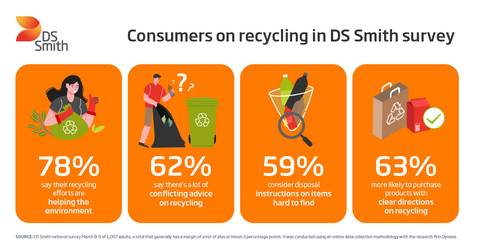Survey cites preference for well-marked recyclable items, need for clearer directions
If retailers want to attract and keep more environmentally conscious consumers in today’s demanding marketplace, their products should have clearer directions on recycling, according to a national survey by sustainable packaging leader DS Smith.
This press release features multimedia. View the full release here: https://www.businesswire.com/news/home/20220324005752/en/

Consumers more likely to buy goods with clearer recycling directions as DS Smith reveals its top 12 hard-to-recycle items. Survey cites preference for well-marked recyclable items, need for clearer directions. (Graphic: DS Smith)
Nearly two thirds (63%) of those polled say they’re more likely to purchase those well-marked products, yet another sign of environmental concerns driving shopper preferences. Overall, 59% say disposal instructions on items are hard to find and 62% say there’s a lot of conflicting advice on recycling.
The company also unveiled the “Dirty Dozen” – the top 12 items being put into mixed or paper recycling streams but harder to recycle due to plastic and food contamination. Among the most common culprits: junk mail, glittery wrapping paper, padded envelopes, sandwich wrappers and microwavable food trays.
DS Smith regularly tests public sentiment as part of its focus on creating innovative and sustainable packaging solutions, designing out waste and supporting the reuse of materials to support the circular economy.
“We’re committed to helping our customers be more circular and educating their customers as well, and this requires collaboration across business, municipalities, and consumers,” said Toby Earnest, head of recycling for DS Smith in North America. “We all need to be aware of plastic and other unrecyclable items that can cause significant challenges at paper mills, adding additional costs and waste into paper making. There is also a significant environmental impact when large volumes of any of the ‘Dirty Dozen’ end up in paper recycling streams.”
The survey March 8-9 revealed sharp awareness by consumers of the important role they play – with 78% saying their recycling efforts are helping the environment and 72% having access to at-home or curbside recycling.
The poll indicated that while a majority of consumers embrace recycling, many are unsure what items can be – and that means too many throwaways being put into mixed or paper recycling streams that shouldn’t be.
To help consumers, the company identified the “Dirty Dozen,” the top 12 consumer items tripping up recycling:
Food trays: Cardboard food trays used in the oven often contain lamination that makes them difficult to break down in the paper-making process. They are also often contaminated with food, which is not permitted for recycling.
Pulp fruit trays: These trays often contain low-quality weak fibers, meaning they are not strong enough to be made into other paper packaging products.
Food cartons: The plastic layer coating some cardboard cartons is difficult to break down and clings to the cardboard, reducing its recyclability.
Potato chip tubes: Known as composite packaging, these tubes contain over 50% of non-paper materials that cannot be recycled at paper mills.
Glittery gift wrap and greetings cards: Gift wrap and cards wrapped in plastic or contain glitter or metal can cause damage to recycling machinery.
Padded envelopes: The high volume of plastic in padded envelopes makes it difficult to separate the cardboard and plastic elements.
Sandwich wrappers: Plastic lamination on sandwich packaging (up to 20% of the wrapper) makes it difficult to separate the cardboard and plastic elements. Food contamination also hurts the quality of the recyclable materials.
Insulated food delivery packaging: Waterproof fiber packaging takes longer to break down and contains plastic thermal layers that causes contamination issues at the mills.
Coffee bags and pouches: Metal coatings on coffee bags can break into glitter-like parts, contaminating the finished paper.
Wax and silicone papers: Like those on sticks of butter, wax and silicone coatings make it difficult for paper machines to access the recyclable fibers, and those that are retrieved often are poor quality.
Fast food soft drink cups: These often can be double laminated, making it even more difficult to be broken down and the recyclable fibers retrieved.
DS Smith also is working with the packaging supply chain to tackle the issue of hard-to-recycle packaging products. Its research and development team also is exploring ways to replace packaging solutions and applications that contain hard-to-recycle plastics.
DS Smith’s innovative packaging products are designed using its proprietary Circular Design Principles, which were developed in collaboration with the Ellen MacArthur Foundation. All of DS Smith’s 700 designers have been trained on how to apply the principles to design packaging solutions fit for the Circular Economy, and help its customers reach their corporate sustainability and ESG goals.
Methodology
The poll was conducted March 8-9 with 1,007 respondents, a total that generally has a margin of error of plus or minus 3 percentage points. It was conducted using an online data collection methodology with the research firm Dynata.
About DS Smith
DS Smith is a leading provider of sustainable, fiber-based packaging worldwide, supported by recycling and papermaking operations. It plays a central role in the value chain across sectors including e-commerce, fast moving consumer goods and industrials. Through its purpose of “Redefining Packaging for a Changing World” and its Now and Next sustainability strategy, DS Smith is committed to leading the transition to the circular economy, while delivering more circular solutions for its customers and wider society – replacing problem plastics, taking carbon out of supply chains and providing innovative recycling solutions.
Its bespoke box-to-box in 14 days model, design capabilities and innovation strategy sits at the heart of this response. A Strategic Partner of the Ellen MacArthur Foundation, North American operations are headquartered in Atlanta, with 15 manufacturing, paper and recycling facilities, totaling more than 2,000 employees. DS Smith operates in 34 countries employing around 30,000 people and is a Strategic Partner of the Ellen MacArthur Foundation.
View source version on businesswire.com: https://www.businesswire.com/news/home/20220324005752/en/
Contacts
Mindy Myrick, Head of Corporate Affairs
mindy.myrick@dssmith.com / +1 410-251-9570
Caroline Curran, Hill+Knowlton Strategies
caroline.curran@hkstrategies.com / +1 256-653-5811






